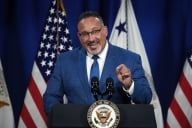You have /5 articles left.
Sign up for a free account or log in.
Dozens of scholarly groups have issued statements condemning the purges in higher education in Turkey that followed the recent coup attempt. In the immediate days after the failed coup, the Council of Higher Education demanded the resignation of more than 1,500 university deans. More than 15,000 education ministry officials were suspended and 21,000 schoolteachers had their licenses revoked. The government also reportedly banned professional travel for all academics.
Twenty-four academic associations, including the American Anthropological Association, the American Sociological Association, the Middle East Studies Association, the Modern Language Association and the Ottoman and Turkish Studies Association, issued a joint statement last week noting “with profound concern the apparent moves to dismantle much of the structure of Turkish higher education through purges, restrictions and assertions of central control, a process begun earlier this year and accelerating now with alarming speed.”
“As scholarly associations, we are committed to the principles of academic freedom and freedom of expression,” the statement continues. “The recent moves in Turkey herald a massive and virtually unprecedented assault on those principles. One of the Middle East region’s leading systems of higher education is under severe threat as a result, as are the careers and livelihoods of many of its faculty members and academic administrators.”
The American Political Science Association also sent a letter to Turkish President Recep Tayyip Erdoğan expressing “our deepest concern and continued alarm regarding reports of purges, punitive measures and other steps taken in a wholesale manner against political scientists and other scholars in Turkey.”
“Like many, we are extremely concerned that the scale and speed of these responses represents a lack of due process and lack of specific evidence of involvement with the coup by the individuals who have been targeted. These steps suggest a broad campaign against intellectuals and intellectual expression, in violation of Turkey’s international and domestic legal obligations to protect institutional autonomy and academic freedom, including under Turkey’s constitution,” association leaders wrote.








